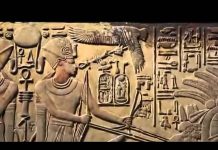In the annals of ancient history, the mysterious tale of King Cambyses II’s lost army has captivated generations with its enigmatic disappearance in the Egyptian desert. Centuries after their ill-fated mission to conquer the Egyptian temple of Amon, the fate of over 50,000 troops remains shrouded in ambiguity. Did this event truly transpire, or has it been embellished into a grandiose myth over time? “The Lost Army of King Cambyses” takes audiences on an enthralling journey through time and the relentless pursuit to uncover the truth behind this historical enigma.
Throughout the ages, countless archeologists, geologists, and historians have embarked on quests to shed light on the fate of the lost army. One prominent figure, desert explorer Laszlo Almasy, famously claimed to have found evidence of the army’s presence in the 1930s. Regrettably, the exact location of his supposed discoveries perished with him, leaving the mystery unresolved.
In 1996, a stroke of serendipity led another explorer to stumble upon a collection of bone fragments and ancient arrowheads in the Egyptian desert. However, he faced a roadblock when Egyptian authorities barred his return to the site, leaving the potential breakthrough buried once again. Nevertheless, a new team of intrepid explorers determinedly took up the challenge, picking up where their predecessors left off.
“The Lost Army of King Cambyses” presents a gripping account of this contemporary expedition, as modern-day explorers venture into the barren wasteland in search of one of the most profound archeological discoveries in history. Amidst the harsh and unforgiving desert landscape, the film enthralls with a sense of suspense, curiosity, and an insatiable thirst for knowledge.
As the team traverses the desert, the documentary explores the viability of King Cambyses II’s audacious journey to conquer the Egyptian temple. Skepticisms arise about the army’s ability to successfully undertake such an arduous expedition. The sheer scale of resources required, estimated at over 3,000 tons of food, water, and supplies, raises questions about the practicality of their undertaking.
Moreover, the unfamiliarity of the terrain and the absence of sophisticated maps add to the intrigue. The filmmakers juxtapose modern knowledge with ancient history, inviting viewers to contemplate the hardships and uncertainties that the lost army would have faced in navigating the desert.
Beyond the suspense of unearthing ancient truths, “The Lost Army of King Cambyses” offers a rich perspective on ancient Egyptian history. The documentary immerses the audience in the world of desert oases, allowing them to grasp the tactile reality of life in this harsh environment, evoking a profound appreciation for the resilience of those who lived amidst such challenging circumstances.
Throughout the film, a sense of wonder and curiosity prevails, echoing the sentiments of those who seek to illuminate the shadows of history. The Lost Army of King Cambyses becomes an emblem of the human quest for knowledge, a thirst for understanding the mysteries of the past that drives exploration and discovery.
In conclusion, “The Lost Army of King Cambyses” is a captivating expedition through time and history, offering a tantalizing glimpse into the enigmatic disappearance of a formidable army. As the modern-day explorers brave the desert, the film invites us to reconsider our understanding of ancient history and the relentless pursuit of uncovering the truth. The tale of King Cambyses II’s lost army continues to captivate our imagination, leaving us with a sense of wonder and reverence for the enigmatic narratives that shape our understanding of the past.

































